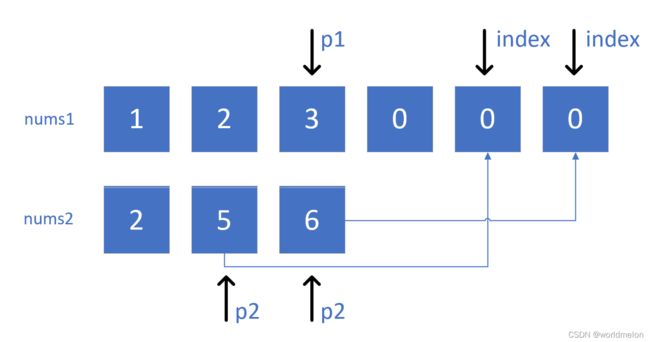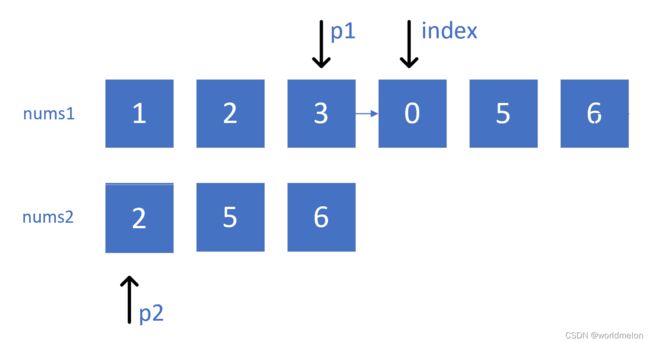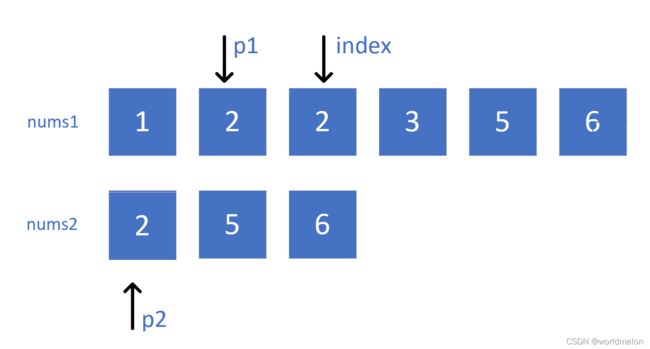Merge Sorted Array(LeetCode No.88)
Question:
You are given two integer arrays nums1 and nums2, sorted in non-decreasing order, and two integers m and n, representing the number of elements in nums1 and nums2 respectively.
Merge nums1 and nums2 into a single array sorted in non-decreasing order.
The final sorted array should not be returned by the function, but instead be stored inside the array nums1. To accommodate this, nums1 has a length of m + n, where the first m elements denote the elements that should be merged, and the last n elements are set to 0 and should be ignored. nums2 has a length of n.
Example 1:
Input: nums1 = [1,2,3,0,0,0], m = 3, nums2 = [2,5,6], n = 3
Output: [1,2,2,3,5,6]
Explanation: The arrays we are merging are [1,2,3] and [2,5,6].
The result of the merge is [1,2,2,3,5,6] with the underlined elements coming from nums1.
Example 2:
Input: nums1 = [1], m = 1, nums2 = [], n = 0
Output: [1]
Explanation: The arrays we are merging are [1] and [].
The result of the merge is [1].
Example 3:
Input: nums1 = [0], m = 0, nums2 = [1], n = 1
Output: [1]
Explanation: The arrays we are merging are [] and [1].
The result of the merge is [1].
Note that because m = 0, there are no elements in nums1. The 0 is only there to ensure the merge result can fit in nums1.
Constraints:
- nums1.length == m + n
- nums2.length == n
- 0 <= m, n <= 200
- 1 <= m + n <= 200
- -109 <= nums1[i], nums2[j] <= 109
Follow up: Can you come up with an algorithm that runs in O(m + n) time?
Solution:
My C Version:
Initially, It's easy for us to learn that we can compare the value of them and insert nums2 to its proper position in num1.
void merge(int* nums1, int nums1Size, int m, int* nums2, int nums2Size, int n){
for(int index = m + n - 1, p1 = m - 1, p2 = n - 1; index >= 0;index--)
{
if(nums1[p1] < nums2[p2])// nums[p1] < nums[p2] move to num1[index], move p2
nums1[index] = nums2[p2--];
}
}But it's hard for us to handle the conflict when it comes to nums1[p1] = 3 and nums[p2] = 2.One possible version is that we can move 3 backforward. Therefore, we added an if branch statement.
void merge(int* nums1, int nums1Size, int m, int* nums2, int nums2Size, int n){
for(int index = m + n - 1, p1 = m - 1, p2 = n - 1; index >= 0;index--)
{
if(nums1[p1] < nums2[p2])// nums[p1] < nums[p2] move to num1[index], move p2
nums1[index] = nums2[p2--];
else if(nums2[p2] < nums1[p1])//nums[p2] < nums[p1] move to num1[index], move p1
nums1[index] = nums1[p1--];
}
}However, you will find that p2 come to its end.Therefore, we just need to insert and take each item of num1.
void merge(int* nums1, int nums1Size, int m, int* nums2, int nums2Size, int n){
for(int index = m + n - 1, p1 = m - 1, p2 = n - 1; index >= 0;index--)
{
if(p1 < 0)//nums1 run out, get nums2
nums1[index] = nums2[p2--];
else if(p2 < 0)//nums2 run out, nums1 is fun ,break
break;
else if(nums1[p1] < nums2[p2])// nums[p1] < nums[p2] move to num1[index], move p2
nums1[index] = nums2[p2--];
else if(nums2[p2] < nums1[p1])//nums[p2] < nums[p1] move to num1[index], move p1
nums1[index] = nums1[p1--];
}
}
Key word:Two pointer,Array,Sorting,Merge


